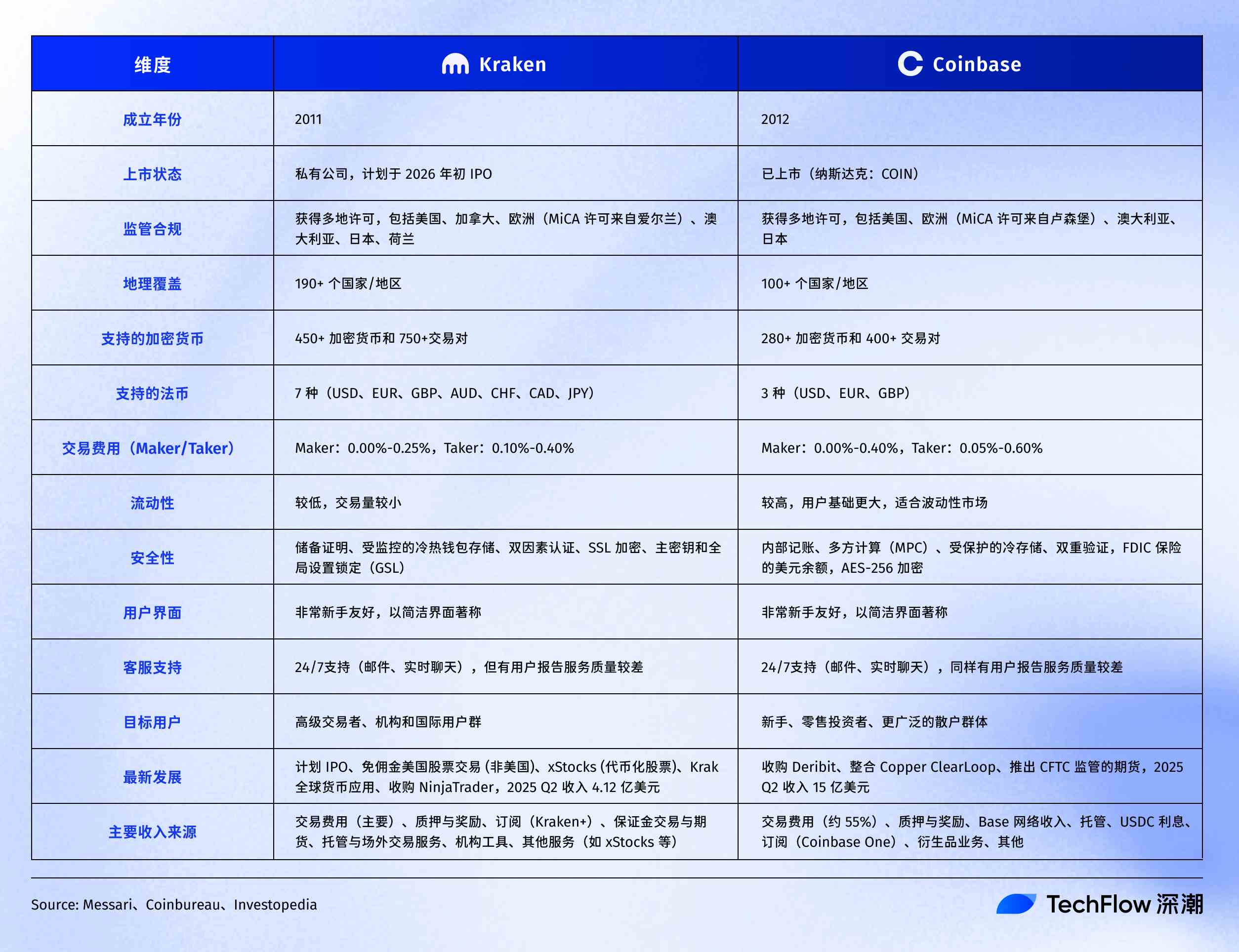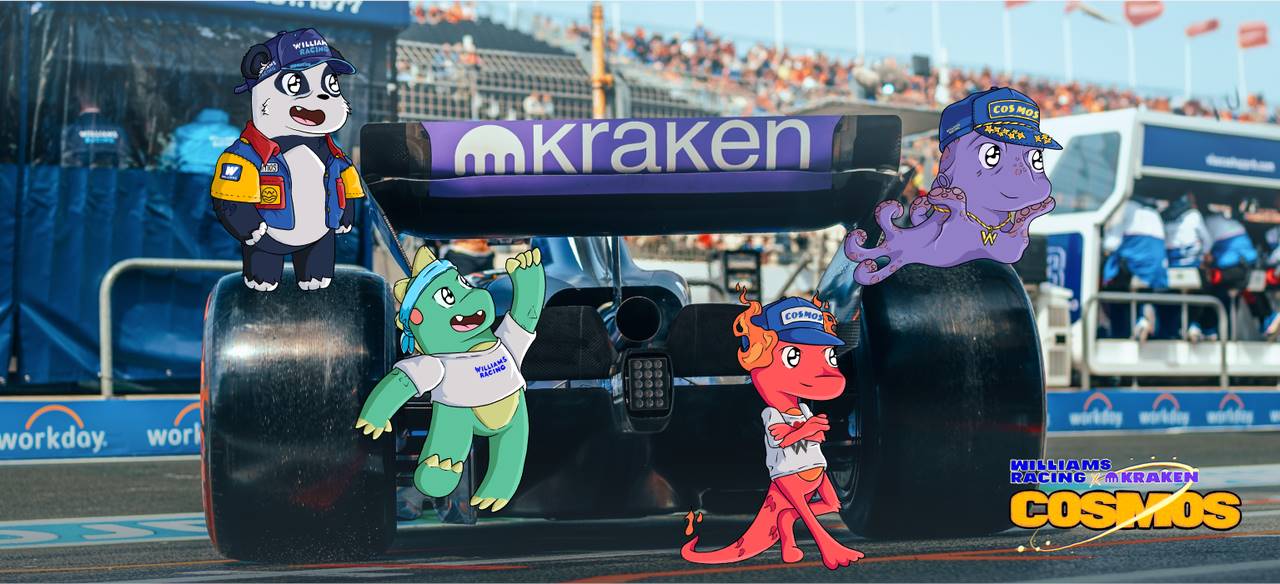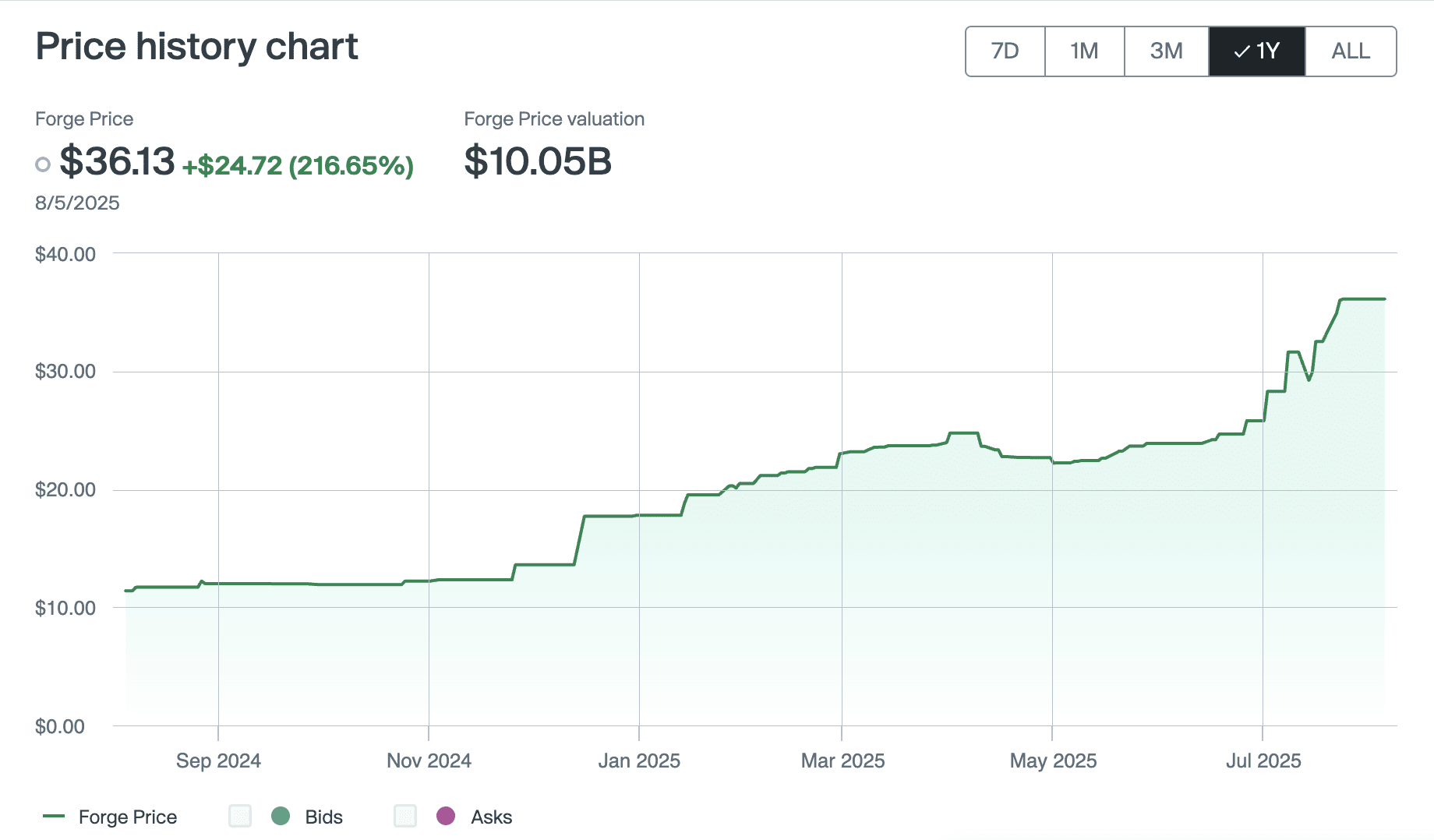Original Title: (On the Eve of the IPO, Kraken Awakens)
Original authors: Yanz, Liam, Deep Tide TechFlow
In July 2025, the crypto market ignited the flames of a bull market once again.
Unlike past bull markets, cryptocurrencies such as Bitcoin are now deeply integrated with U.S. stocks in this cycle. While everyone is focusing on Robinhood's stock tokenization, an established exchange that had been quiet for years is quietly opening the door to the capital market.
This exchange is called Kraken.
It was once known as 'the big brother of the crypto world', safe and steady, yet long hidden in the shadows of giants Coinbase and Binance. In the Chinese community, it has long been labeled as 'a safe withdrawal channel', having been so low-key at one point that it was nearly forgotten.
Now, the situation has changed.
In the Kaiko global spot exchange comprehensive score in the second quarter of 2025, Kraken scored 89 points, ranking second only to Coinbase; quarterly revenue grew by 18%, with trading volume reaching $186.8 billion; launched Layer 2 network Ink, stock tokenization platform xStocks, and acquired NinjaTrader... the long-dormant sea monster suddenly turned over, causing a stir on Wall Street.
By the end of July, Kraken was preparing for its final round of financing with a valuation of $15 billion, in preparation for the 2026 IPO.
From 'the honest person in the geek circle' to 'the next crypto unicorn', there lies a long internal struggle. The story of Kraken is a transformation history spanning 14 years.
From card dealer to exchange founder
In the 1990s, Jesse Powell was just a teenager obsessed with (Magic: The Gathering).
Unlike other battle-hungry players, he was better at finding arbitrage opportunities in the card market—this was when he first realized: 'Any valuable thing can be priced and traded.'
After the millennium, Powell worked in technical support at an internet service provider. Online gaming (Ultima Online) became popular in the office.
This was the first large online game with real currency trading elements, where a virtual castle could sell for thousands of dollars. Exchanging virtual items for real money made Powell see the embryonic form of 'asset digitization'.
Not long after, he became fascinated with (Diablo 2). At first, he simply fought monsters and sold equipment, with ordinary players earning about $25 an hour being considered good. But Powell quickly discovered a more efficient arbitrage method: exchanging $5 of in-game gold for rare items and then selling them on eBay for $30, achieving 6 times the profit with each transaction. This side business later expanded to over 20 games, evolving into a small virtual currency trading empire.
Powell later referred to this experience as 'the prelude to cryptocurrency'.
In 2010, Bitcoin entered the spotlight.
Powell initially thought it was just another form of 'World of Warcraft gold'. But he soon realized that Bitcoin solved the core issues in virtual currency trading—refund disputes, delivery difficulties, and expensive cross-border payments... The decentralization and low-cost transactions of Bitcoin made Powell realize: 'This can change not only the virtual gaming economy but even reshape the financial system in reality.'
In just one year, he transformed from a virtual game currency merchant into a Bitcoin enthusiast.
In 2011, a friend he met while playing (Magic: The Gathering) invited him to visit the then largest Bitcoin exchange in the world, Mt. Gox's office. Rather than a visit, it was more about solving problems.
During that visit, the infamous 880,000 stolen coins case broke out. Powell spent about a week and a half helping Mt. Gox resume operations, and it was at that time he intuitively saw the enormous risks in the crypto world:
"If cryptocurrency wants to enter the mainstream, it needs a more serious player—a safe, compliant exchange that can win the trust of regulators and users."
In the same year, Jesse Powell and technical partner Thanh Luu officially established Kraken in San Francisco.
Unlike other speed-seeking entrepreneurs, Powell spent a whole year assembling a security team, undergoing third-party audits, and pioneering two-factor authentication (2FA), becoming one of the first crypto exchanges to publicly prove its security capabilities.
In the following decade, Kraken walked the path of slow-paced expansion.
In 2013, it became one of the first overseas exchanges to receive permission from Japan's Financial Services Agency; in 2014, it assisted in the asset liquidation of Mt. Gox's collapse, further establishing its reputation for compliance and security; by 2020, it had developed operations in over 200 countries and regions, obtaining licenses from multiple countries including the U.S., Canada, the U.K., Japan, and Australia, becoming one of the most comprehensive compliant exchanges in the world.
The groundwork for steady expansion has been laid; Kraken just needs an opportunity to turn.
The transformation of an established exchange
For a long time, Kraken has been labeled as 'established, safe, low-profile', but behind this label lies 'stuffy, outdated'.
In the Chinese crypto circle, it has long been labeled as 'the safe exit channel' because it can quickly trade stablecoin USDT for fiat currencies such as USD and EUR. In the eyes of the public, it resembles an old-fashioned bank: stable and reliable, but lacking brand brilliance and has never led the narrative.
In contrast, Coinbase, also based in the U.S., is like the 'Apple' of the crypto world—polished, easy to use, and ubiquitous.
It excels in marketing, from Coinbase Learn educational content to the Super Bowl ad in 2022, NBA collaborations, esports team sponsorships, and celebrity endorsements, gradually becoming synonymous with crypto assets in the minds of Americans.
In contrast, Kraken's first thirteen years were more like a tech-savvy person's self-cultivation, akin to 'Linux'—powerful, professional, but long-lived in the geek circle.
Social media data might better illustrate the issue: while Coinbase's X fan base has reached 6.5 million, Kraken is still lingering at 1.6 million.

However, all of this was completely overturned in 2025.
Kraken frequently made headlines, and its honest, invisible image was no longer present, replaced by a vibrant, action-oriented crypto giant:
· Stock Tokenization (xStocks): Launched tokenized stocks and ETF trading on the blockchain in collaboration with Backed Finance, covering over 60 U.S. stock assets including Apple, Tesla, and Nvidia.
· Traditional Finance Acquisition: Acquired retail futures platform NinjaTrader for $1.5 billion, expanding derivatives and futures trading.
· Stablecoin Ecology: Strategic investment in stablecoin issuer StablR, promoting the global application of EURR and USDR.
· Layer 2 Ecology Ink: Building its own blockchain network and laying out on-chain financial infrastructure.
· Institutional Services: Kraken Institutional provides full-stack digital asset services for hedge funds and ETF issuers.
The transformation on the marketing side came a bit earlier. Starting in 2023, Kraken also began to fill its brand shortfalls.
From 2023 to 2025, Kraken sponsored the Williams Racing F1 team just in time, enhancing brand influence, followed by the launch of the Grid Pass digital collectibles (NFT), attracting high-net-worth individuals through the global live broadcast of racing events.

In 2024, Kraken successively reached jersey sponsorship collaborations with Tottenham Hotspur in the Premier League, Atletico Madrid in La Liga, and RB Leipzig in the Bundesliga, allowing the Kraken logo to appear in global sports broadcasts.
The awakening of both Kraken's brand and business is merely a surface phenomenon; the fundamental change lies in the crisis.
In 2022, Kraken experienced a management crisis.
At that time, CEO and co-founder Jesse Powell's strong libertarian cultural philosophy clashed with the team's values, causing internal dissatisfaction and team turbulence. The former CMO Matt Mason left after just one year in February 2020, and his position remained vacant for two years; the product head changed three times in four years; since 2021, the chief business officer position has been vacant, and later the position was simply eliminated...
Management positions remain vacant, and the team is divided. Founder Powell chose to resign as CEO in 2022 and assumed the role of board chair.
This change is not only a transfer of power but also a deep reflection on corporate culture.
Since then, Kraken has embarked on a path of transformation.
In the same year, Mayur Gupta joined as CMO, reshaping Kraken's image for the first time with global brand marketing; sports sponsorships, NFT collections, and content dissemination allowed this 'tech-savvy exchange' to engage with Generation Z for the first time.
The series of marketing strategies he led were later recognized by the market and listed as one of the 'most innovative CMOs of 2024' by Business Insider.
More significant business changes occurred at the end of 2024 when Tribe Capital co-founder Arjun Sethi joined Kraken as co-CEO.
It is noteworthy that Tribe Capital is Kraken's second largest institutional investor, and founder Arjun Sethi joined Kraken's board in 2020. From the outside, this also appears to be a self-rescue by shareholders.
Sethi, who comes from a Silicon Valley VC background, believes that Kraken must complete an identity upgrade, with only one keyword—'breaking the circle'.
Transforming from a single cryptocurrency exchange into a global digital financial platform.
Under Sethi's leadership, Kraken launched the stock tokenization trading platform xStocks; acquired NinjaTrader, expanding derivatives and futures trading...
Sethi stated, 'We are open to more acquisitions in the future.'
This co-CEO believes that a new area of 'huge potential' for digital assets is corporate financial management, as 'many public and private companies are exploring holding cryptocurrencies.'
Today's Kraken has emerged from the shadow of past internal struggles, no longer the silent sea monster. It now has a new voice, a new brand, and a new story.
It is no longer satisfied with being a safe harbor for crypto but aims to build a bridge across crypto assets and traditional finance, even becoming a core participant in the global asset tokenization wave.
This 14-year-old established exchange began to rush toward the IPO stage with a brand new posture.
Heading towards IPO
At the end of July 2025, according to The Information, Kraken is raising $500 million in new funding at a valuation of $15 billion, a 36% increase from about $11 billion in 2022.
According to data from the over-the-counter equity trading platform Forge, Kraken's stock OTC quotes have risen over 2 times in the past year, with a current valuation exceeding $10 billion.

This financing is widely regarded in the industry as the final sprint before the IPO, with Kraken expected to enter the capital market as early as the first quarter of 2026.
For Kraken, this is an excellent policy window.
In March 2025, the U.S. SEC withdrew the lawsuit against Kraken for securities violations; in June of the same year, Kraken obtained the EU crypto asset market (MiCA) license, achieving comprehensive compliance operations in the EU.
All of this is inseparable from Trump's friendly policies toward the crypto industry and Kraken founder's early bets on Trump.
In June 2024, Kraken co-founder Jesse Powell personally donated $1 million worth of crypto assets, mostly ETH, to Trump. After Trump launched the meme coin TRUMP, Kraken became the first U.S. cryptocurrency exchange to list the TRUMP token.
In addition to policy support, Kraken also demonstrated strong momentum in business operations and financial data.
From a business perspective, Kraken's revenue structure is diverse and continues to enrich, primarily including trading fees, Staking rewards, leverage and derivatives services, as well as asset custody, OTC matching, and institutional customization tools, with trading fees being the core.
In 2024, Kraken achieved $1.5 billion in revenue, and in the first half of 2025, it recorded quarterly revenues of $472 million and $412 million, representing year-on-year increases of 19% and 18%, respectively. Adjusted EBITDA reached $187 million and $80 million, respectively.
In the second quarter of 2025, Kraken's total trading volume reached $186.8 billion, a 19% year-on-year increase; the managed platform assets were $43.2 billion, a 47% year-on-year increase; total customers exceeded 15 million, supporting over 200 digital assets and 6 national currencies.
Compared to Coinbase, Kraken's current daily trading volume is about $1.37 billion, about half that of Coinbase. However, Kraken is carving out an independent path through differentiated business narratives.
The first to bear the brunt is stock tokenization.
Kraken is one of the biggest promoters of stock tokenization. On the xStocks platform launched in collaboration with Backed Finance, over 60 stock tokens including Apple, Tesla, and Nvidia have been launched, opening up a new entry for non-U.S. investors to purchase stocks of U.S. listed companies, available for trading 24/7. Users can also use xStocks for DeFi collateral, liquidity pools, and smart contract invocation, achieving results that traditional securities trading cannot match.
The future Kraken's identity is no longer limited to an exchange; it is more likely to evolve into a 'Kraken Bank'.
As early as September 2020, Kraken became the first digital asset company in the U.S. to obtain a special purpose depository institution (SPDI) bank license in Wyoming. This means Kraken can provide digital asset custody, U.S. dollar deposit accounts, and 24/7 settlement services like a traditional bank, but it must adopt a full reserve system to avoid risks associated with partial reserves.
In the future, Kraken plans to launch a wider range of financial products, including debit cards for institutions and individuals, mobile banking products connected to crypto wallets, wealth management, and payment solutions.
In its official announcement, it constantly reflects on the idea of building a bridge between the future cryptocurrency economy and the existing financial system. Everything echoes Jesse's recollection of the founding of Kraken: for cryptocurrency to enter the mainstream market, it needs a serious player—a player that can operate stably, cooperate with regulators and law enforcement, explain cryptocurrency to banks, and build a bridge from the traditional system to the crypto world.
Original link




